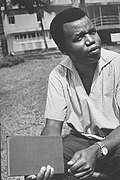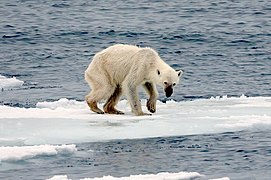Wikipedia:Wikipedia Signpost/2022-01-30/WikiProject report
The Forgotten Featured
- This column usually profiles WikiProjects. This month we have a contribution from a working group member, who will explain the difference between these types of collaborative activity in the Wikipedia community. – S
The Unreviewed featured articles 2020 working group is not a WikiProject with a formal list of members, but a working group that any editor can contribute to. They often are temporary and don't need formal approval. By any name, whether WikiProject or working group, the spirit of collaboration is the important part. The immense feat of coordinating such a large effort drew me to this working group, as did its recent first anniversary. So, why clean up Featured Articles? And why have a working group about doing it?
What is the Unreviewed featured articles 2020 working group, and why have an unreviewed featured article working group?
- SandyGeorgia: URFA/2020 is a list started by a group of editors from Featured article candidates (FAC) and Featured article review (FAR) who recognized the need for a systematic way to review older featured articles (FA). URFA/2020 is not part of FAR, but complements FAR while also encouraging maintenance of those older FAs that don't need a formal review. The process was based on the 2006 version of URFA to bring older FAs up to standards after a requirement for inline citations was added to the FA criteria. That effort concluded in 2010, and participation at FAR fell off dramatically; a decade passed and the number of old FAs that needed a fresh look was daunting. SD0001 responded to a request to generate the list, the Today's featured article (TFA) date was added to help the TFA coordinators, and we were off. The list provided the means for more editors to engage.
- Hog Farm: FA standards have risen somewhat from the early days of FAC, and we've sadly lost a number of excellent FA writers over the years, leaving many FAs unwatched or unmaintained. We point FAs to readers as Wikipedia's best work, but if many of them have been allowed to fall out of date, or are poorly sourced, or have accumulated poor material because of the lack of a watching eye, then the claim of best work really isn't meaningful. Additionally, it's often good to point to another FA as a model for how get a similar topic to featured article status, but if many don't reflect the current FA criteria, it's harder to use existing FAs as a guide to creating newer ones. It's good for both readers and editors to keep our existing FAs at high quality.
- Jimfbleak: FAs can deteriorate over the years. They can become outdated, an obvious risk for BLPs and modern geography topics, but also for many other subjects where new research may inform changes. Even the bird articles I tend to write can have significant issues with regard to taxonomy and conservation status. Later additions to FAs may also not meet FA standards, either being unreferenced, referenced to non-RS sources, or incompletely referenced, e.g. book refs with no page number(s).
What motivated you to become a member of the Unreviewed featured articles 2020 working group?
- Hog Farm: It started for me, as someone who primarily edits American Civil War material, when I saw the Battle of Shiloh in 2020 was a FA, but had unreliable sources, balance issues, and uncited text. As I got more involved with FAR, I realized that a lot of older FAs had similar issues. As someone who's been involved in the FAC process extensively over the last 1.5 years (I'm a current FAC coordinator), I think it's important to have a strong collection of FAs – both so that readers are seeing the best material, and also to point to serve as guides for how FA content can be written.
- Jimfbleak: I became drawn in almost by accident, having been asked to comment on an old FA because of my specialist knowledge of the topic. That made me aware of the need to review older articles to keep them up to standard. I've tended to concentrate on biological topics because I'm more familiar with the problems that are likely to occur, and have the resources to fix them, but in practice I'll have a look at anything I'm reasonably confident I can tackle.
- Z1720: I was completing WP:COI edit requests and editors asked for examples that showed how Wikipedia articles are formatted. I wanted to use featured articles as these are supposed to show Wikipedia's best work. Unfortunately, there were about eight articles on companies, and most were far from fulfilling the FA criteria. I found URFA/2020 while exploring how to initiate a review on articles that were far from the FA standards. I stayed when I realized that there were lots of featured articles that needed improvements.
- SandyGeorgia: Partly the camaraderie and collaborations that developed during the 2006–2010 URFA effort around "saving" work done originally by others, and partly my own (selfish) motives. Medical FAs I work on require at least yearly updates, so I am concerned whenever I hear disparaging comments about older FAs, having kept one I wrote in 2006 up to current standards. Perception of the overall FA pool is negatively impacted by the weakest ones.
What do you see as some of the biggest achievements of the Unreviewed featured articles 2020 working group and are there any contributions you are particularly proud of?
- Z1720: In October, an editor posted on WT:URFA/2020 asking for a review of Basiliscus. Using the article's talk page, editors worked together to find new sources, update the prose and ensure that the article was brought back to FA standards without an FAR nomination. It was a great collaborative effort and the spirit of what URFA/2020 hopes to achieve.
- Hog Farm: It's been great to see some of the collaborations that have occurred on FAR, or article talk pages, or other spots. Aside from Z's mention of Basiliscus, and the five represented in the gallery below, we've also seen restorations of the significant Battle of Tippecanoe, Hall of Famer Lee Smith (baseball), the Great Lakes Storm of 1913, and the History of timekeeping devices. The initiative has really helped bring about some excellent refurbishments and collaborations to restore older featured articles.
- SandyGeorgia: Like others, it is the featured articles that are "saved", or restored without a trip to FAR, that keep me interested. Conversely, a hard part about working at FAR is that so many of the original FA writers who worked on the 2006 URFA, and helped build the FA process, are now gone; my heart sinks when one of their older FAs comes up at FAR and can't be rescued. I am particularly proud that FAR doesn't facilitate the quick or easy stripping of Featured status; the FAR coordinators have the patience of saints, are immune to the effects of disruption, and are willing to let reviews stay open if progress is being made.
|
*These received a Million Award
|
What does an average day at the Unreviewed featured articles 2020 working group look like? What roles and tasks do you associate with your WikiProject, and how do you go about fulfilling them?
- Z1720: Some editors make notes on article talk pages to suggest improvements. Others will directly edit the article to add high-quality sources, remove excess words, or conduct a copyedit. Others nominate articles at WP:FAR or comment on active FARs. Editors have a lot of control over how much time and which articles they want to review.
- Hog Farm: It's not really a fixed process. I watchlist WP:FAR, WP:FARGIVEN, and the two URFA/2020 pages. It generally involves keeping up with making sure new FARs or notices of need for FAR are represented at both the URFA/2020 pages and FARGIVEN, as well as reviewing articles on the URFA pages and commenting at FARs. I personally spend time every week looking through the FARGIVEN list to informally see which ones should be the highest priority for the limited slots at FAR (each editor can only initiate one FAR per week, and there is a cap on how many each editor can have open for a time, so I try to save my nominations for those that really need it).
- SandyGeorgia: I read FAR top to bottom pretty much every day, and pitch in wherever needed. Then I check all new entries on the URFA/2020 list. Early on, I had a goal of reviewing at least five (hopefully ten) older FAs on the list daily, but I've found it necessary to spend more time on the bookkeeping. The two lists (old and very old FAs) track 4,526 articles, and will become unuseful if the Notes columns are not kept in sort order. With so many other competent reviewers on board now, I've switched to spending a lot of time just keeping the Notes columns in order and making sure notifications are recorded.
What are the Unreviewed featured articles 2020 working group most pressing needs, and how can a new contributor help?
- Buidhe: What we need most are people who are willing to nominate articles from the list of already noticed articles at Featured article review (FAR) and take it through the process so that the article can either be brought up to standard or delisted. This is suitable for beginners, as concerns with the article have already been identified and all that is needed is a FAR nomination. We also need more editors who are willing to check articles listed at WP:URFA/2020 against the FA criteria and determine if they are satisfactory or need to go to FAR.
- Hog Farm: I think FAR is always an area that could use additional editors. Ideally, FAR is a restoration process, not a delisting one, and it takes editors familiar with topics and sources to bring the shine back to older FAs in less than perfect condition. In a more general sense, what would be the best help would be for editors familiar with the FA standards and processes to look at these older promotions in their areas of specialties. It's just so much easier to give a good assessment of an article's condition if you are familiar with the subject matter.
- SandyGeorgia: Read the 2021 summary and dig in! If you are unsure of where to start, you can just review an old FA, enter notes on article talk, and add a diff to your notes at the URFA/2020 list.
Anything else you'd like to add?
- Jimfbleak: As a TFA coordinator, it's important that when we run older articles at TFA that they are up to scratch. Obviously we check anyway, but the review process, with multiple eyes looking at the texts, is a more efficient way of winnowing the older articles.
- Buidhe: As a FAC coordinator, FAC gets a lot more attention and effort than FAR but the latter process is just as important to maintaining the integrity of featured articles and ensuring that they continue to meet the criteria.
- Z1720: There are lots of featured articles that need a review, so take a look through the list and comment on one that interests you! If you need help finding something to work on, please post at WT:URFA/2020 and someone will suggest articles. I have greatly enjoyed learning about topics that I might not have explored before.
- SandyGeorgia: If you are hoping to someday take an article to FAC, FAR is a good place to get to know the FA standards, as it operates at a slow pace, and you can make mistakes without the pressure of affecting a nominator who is seeking to have an article promoted. Have a look at some articles now at FAR at Category:Wikipedia featured article review candidates.
Thanks to everyone who answered these questions, and also to you, the reader. Please contribute some ideas for WikiProjects to review or any other feedback in the comments below. If you'd like to learn more about the working group and perhaps even participate yourself, the 2021 annual report is a great resource!







Discuss this story